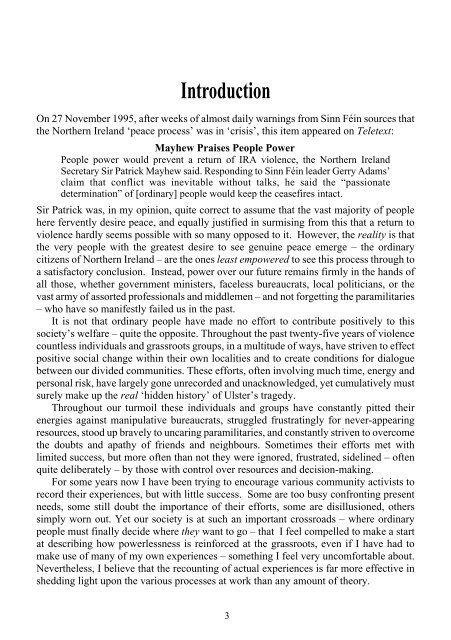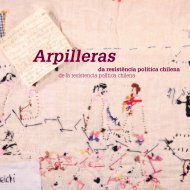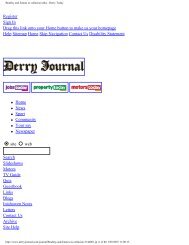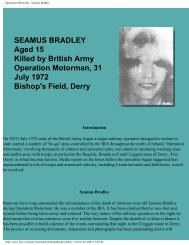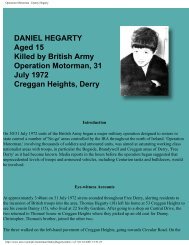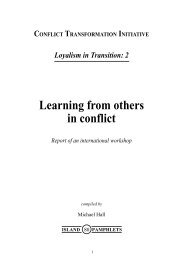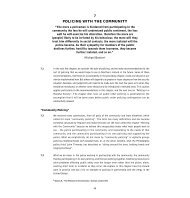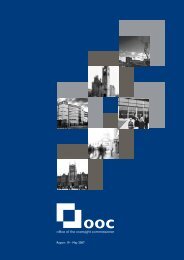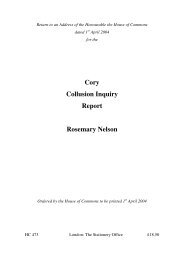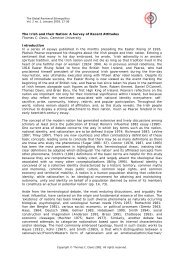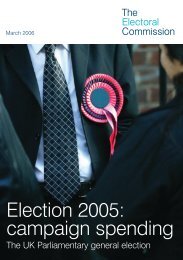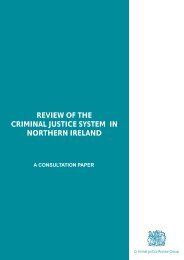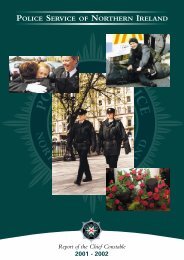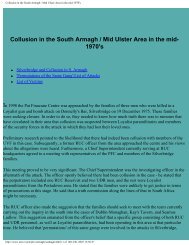(14) Reinforcing Powerlessness - CAIN - University of Ulster
(14) Reinforcing Powerlessness - CAIN - University of Ulster
(14) Reinforcing Powerlessness - CAIN - University of Ulster
You also want an ePaper? Increase the reach of your titles
YUMPU automatically turns print PDFs into web optimized ePapers that Google loves.
IntroductionOn 27 November 1995, after weeks <strong>of</strong> almost daily warnings from Sinn Féin sources thatthe Northern Ireland ‘peace process’ was in ‘crisis’, this item appeared on Teletext:Mayhew Praises People PowerPeople power would prevent a return <strong>of</strong> IRA violence, the Northern IrelandSecretary Sir Patrick Mayhew said. Responding to Sinn Féin leader Gerry Adams’claim that conflict was inevitable without talks, he said the “passionatedetermination” <strong>of</strong> [ordinary] people would keep the ceasefires intact.Sir Patrick was, in my opinion, quite correct to assume that the vast majority <strong>of</strong> peoplehere fervently desire peace, and equally justified in surmising from this that a return toviolence hardly seems possible with so many opposed to it. However, the reality is thatthe very people with the greatest desire to see genuine peace emerge – the ordinarycitizens <strong>of</strong> Northern Ireland – are the ones least empowered to see this process through toa satisfactory conclusion. Instead, power over our future remains firmly in the hands <strong>of</strong>all those, whether government ministers, faceless bureaucrats, local politicians, or thevast army <strong>of</strong> assorted pr<strong>of</strong>essionals and middlemen – and not forgetting the paramilitaries– who have so manifestly failed us in the past.It is not that ordinary people have made no effort to contribute positively to thissociety’s welfare – quite the opposite. Throughout the past twenty-five years <strong>of</strong> violencecountless individuals and grassroots groups, in a multitude <strong>of</strong> ways, have striven to effectpositive social change within their own localities and to create conditions for dialoguebetween our divided communities. These efforts, <strong>of</strong>ten involving much time, energy andpersonal risk, have largely gone unrecorded and unacknowledged, yet cumulatively mustsurely make up the real ‘hidden history’ <strong>of</strong> <strong>Ulster</strong>’s tragedy.Throughout our turmoil these individuals and groups have constantly pitted theirenergies against manipulative bureaucrats, struggled frustratingly for never-appearingresources, stood up bravely to uncaring paramilitaries, and constantly striven to overcomethe doubts and apathy <strong>of</strong> friends and neighbours. Sometimes their efforts met withlimited success, but more <strong>of</strong>ten than not they were ignored, frustrated, sidelined – <strong>of</strong>tenquite deliberately – by those with control over resources and decision-making.For some years now I have been trying to encourage various community activists torecord their experiences, but with little success. Some are too busy confronting presentneeds, some still doubt the importance <strong>of</strong> their efforts, some are disillusioned, otherssimply worn out. Yet our society is at such an important crossroads – where ordinarypeople must finally decide where they want to go – that I feel compelled to make a startat describing how powerlessness is reinforced at the grassroots, even if I have had tomake use <strong>of</strong> many <strong>of</strong> my own experiences – something I feel very uncomfortable about.Nevertheless, I believe that the recounting <strong>of</strong> actual experiences is far more effective inshedding light upon the various processes at work than any amount <strong>of</strong> theory.3


